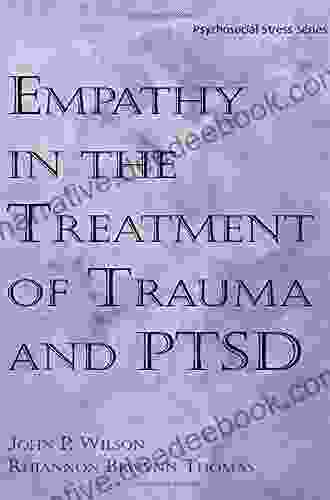Empathy in the Treatment of Trauma and PTSD: Psychosocial Stress Series

4 out of 5
| Language | : | English |
| File size | : | 5973 KB |
| Text-to-Speech | : | Enabled |
| Enhanced typesetting | : | Enabled |
| Word Wise | : | Enabled |
| Print length | : | 405 pages |
| Screen Reader | : | Supported |
Empathy is a crucial component in the treatment of trauma and PTSD. It allows therapists to understand the client's experience and to provide support and validation. This article explores the role of empathy in trauma treatment, including its benefits, challenges, and ethical considerations.
Benefits of Empathy in Trauma Treatment
Empathy offers numerous benefits in the treatment of trauma and PTSD:
- Establishes a therapeutic alliance: Empathy helps build a strong therapeutic alliance between the client and therapist, which is essential for successful treatment.
- Promotes safety and trust: When clients feel understood and validated by their therapist, they are more likely to feel safe and trust the treatment process.
- Reduces isolation and shame: Trauma and PTSD can lead to feelings of isolation and shame. Empathy helps clients feel less alone and reduces the stigma associated with their experiences.
- Facilitates emotional processing: Empathy allows therapists to help clients process their emotions and experiences in a safe and supportive environment.
- Improves treatment outcomes: Studies have shown that empathy is associated with improved treatment outcomes for trauma and PTSD.
Challenges of Empathy in Trauma Treatment
While empathy is essential in trauma treatment, it can also present challenges:
- Empathy fatigue: Therapists may experience empathy fatigue when they are exposed to repeated or severe trauma stories. This can lead to burnout and compassion fatigue.
- Secondary traumatization: Therapists may experience secondary traumatization when they are exposed to traumatic material, which can lead to symptoms similar to those experienced by trauma survivors.
- Cultural differences: Empathy can be influenced by cultural differences, which can make it challenging for therapists to understand and respond to clients from different cultural backgrounds.
- Countertransference: Therapists may experience countertransference, which is when they react to clients based on their own unresolved emotional issues.
Ethical Considerations in Empathy
There are several ethical considerations that therapists should keep in mind when utilizing empathy in trauma treatment:
- Boundaries: Therapists must maintain appropriate boundaries with clients and avoid becoming overly involved in their lives.
- Confidentiality: Therapists must respect client confidentiality and avoid sharing their personal experiences with clients.
- Self-care: Therapists must prioritize their own self-care to prevent burnout and compassion fatigue.
- Cultural sensitivity: Therapists must be aware of their own cultural biases and be respectful of clients from different cultural backgrounds.
Strategies for Developing Empathy in Trauma Treatment
There are several strategies that therapists can use to develop and enhance their empathy in trauma treatment:
- Active listening: Active listening involves paying full attention to clients, both verbally and nonverbally, and demonstrating understanding of their experiences.
- Reflective practice: Reflective practice involves reflecting on your own interactions with clients to identify areas where you can improve your empathy.
- Training: There are many training programs available that can help therapists develop their empathy skills.
- Consultation: Consultation with other therapists or supervisors can provide support and guidance in developing empathy.
Empathy is a fundamental component of effective trauma treatment. It helps clients feel understood, safe, and supported, which facilitates emotional processing and healing. However, empathy can also present challenges, such as empathy fatigue and secondary traumatization. Therapists must be aware of these challenges and take steps to protect their own well-being. By using strategies to develop and enhance empathy, therapists can create a therapeutic environment that is conducive to healing and recovery for trauma survivors.
4 out of 5
| Language | : | English |
| File size | : | 5973 KB |
| Text-to-Speech | : | Enabled |
| Enhanced typesetting | : | Enabled |
| Word Wise | : | Enabled |
| Print length | : | 405 pages |
| Screen Reader | : | Supported |
Do you want to contribute by writing guest posts on this blog?
Please contact us and send us a resume of previous articles that you have written.
 Book
Book Chapter
Chapter Text
Text Story
Story Reader
Reader Library
Library E-book
E-book Magazine
Magazine Bookmark
Bookmark Shelf
Shelf Bibliography
Bibliography Annotation
Annotation Manuscript
Manuscript Scroll
Scroll Codex
Codex Tome
Tome Bestseller
Bestseller Classics
Classics Narrative
Narrative Biography
Biography Memoir
Memoir Encyclopedia
Encyclopedia Narrator
Narrator Character
Character Resolution
Resolution Librarian
Librarian Borrowing
Borrowing Periodicals
Periodicals Scholarly
Scholarly Reserve
Reserve Academic
Academic Journals
Journals Rare Books
Rare Books Special Collections
Special Collections Interlibrary
Interlibrary Literacy
Literacy Study Group
Study Group Thesis
Thesis Storytelling
Storytelling Textbooks
Textbooks Verena Pausder
Verena Pausder R J Rushdoony
R J Rushdoony Matt Walker
Matt Walker Edward Lucas
Edward Lucas J B O Neil
J B O Neil Paul Guinery
Paul Guinery Joe Thomas
Joe Thomas Ellen Anderson
Ellen Anderson E T A Hoffmann
E T A Hoffmann Giant Rabbit
Giant Rabbit Carla Shedd
Carla Shedd Brandon Scott
Brandon Scott Brian Baughan
Brian Baughan Laura Lond
Laura Lond May Picqueray
May Picqueray Colette Lacompte
Colette Lacompte Bethany Olds
Bethany Olds Alex Watson
Alex Watson George Wead
George Wead Curtis Edmonds
Curtis Edmonds
Light bulbAdvertise smarter! Our strategic ad space ensures maximum exposure. Reserve your spot today!

 Devin RossThe Practical Guide to Full-Time RV Living: Embracing the Freedom of the Open...
Devin RossThe Practical Guide to Full-Time RV Living: Embracing the Freedom of the Open...
 Donovan CarterThe Big Little Drum: An Enduring Symbol of African American Music and Culture
Donovan CarterThe Big Little Drum: An Enduring Symbol of African American Music and Culture Dylan HayesFollow ·3.3k
Dylan HayesFollow ·3.3k Bradley DixonFollow ·18.2k
Bradley DixonFollow ·18.2k Percy Bysshe ShelleyFollow ·17.7k
Percy Bysshe ShelleyFollow ·17.7k Josh CarterFollow ·13.5k
Josh CarterFollow ·13.5k Oscar WildeFollow ·7k
Oscar WildeFollow ·7k Fyodor DostoevskyFollow ·19k
Fyodor DostoevskyFollow ·19k Allen GinsbergFollow ·10.8k
Allen GinsbergFollow ·10.8k Brian BellFollow ·19.1k
Brian BellFollow ·19.1k

 Dallas Turner
Dallas TurnerParasols and Peril: Adventures in Grace
In the quaint town...

 Caleb Carter
Caleb CarterFlight Attendant Joe: A Dedicated Professional in the...
Flight Attendant Joe...

 Jerry Ward
Jerry WardPick Lottery The List For 23 States August 15 2024
The Pick Lottery is a multi-state lottery...

 Hudson Hayes
Hudson HayesHow the Media Wields Dangerous Words to Divide a Nation
In a world where the media is...

 Curtis Stewart
Curtis StewartThe Magic Mala: A Story That Changes Lives
In the realm of ancient traditions and...

 Raymond Parker
Raymond ParkerEarthly Meditations: A Poetic Tapestry of Nature,...
In the realm of contemporary...
4 out of 5
| Language | : | English |
| File size | : | 5973 KB |
| Text-to-Speech | : | Enabled |
| Enhanced typesetting | : | Enabled |
| Word Wise | : | Enabled |
| Print length | : | 405 pages |
| Screen Reader | : | Supported |








